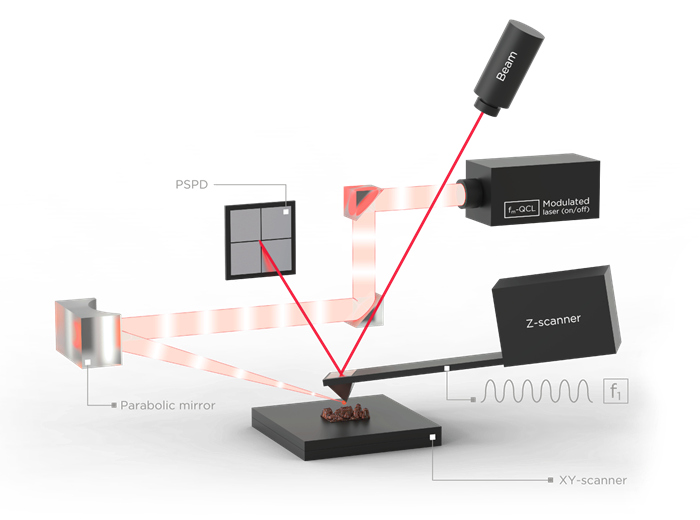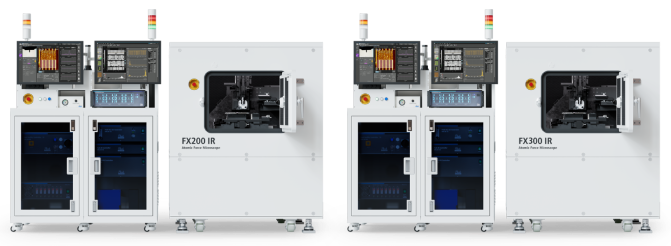Park AFM-IR integrates nanoscale infrared (IR) spectroscopy with atomic force microscopy (AFM), enabling advanced chemical and material characterization. By incorporating the latest infrared spectroscopy innovation — photo-induced force microscopy (PiFM) — into the industry-leading Park AFM platform, this system delivers unmatched performance for nanoscale research.
Advanced Park AFM-IR Spectroscopy
High Spatial Resolution Chemical Imaging
Park AFM-IR provides spatial resolution that exceeds that of traditional IR spectroscopy and other nanoscale techniques, while maintaining consistently high resolution and measurement accuracy throughout the investigation. It uses a non-contact approach to eliminate sample damage and tip contamination, allowing for accurate measurements.
This feature takes molecular research to the nanoscale by providing IR absorption spectra and chemical mapping with spatial resolution as low as 10 nm and monolayer sensitivity. The incorporation of sideband approaches allows for the identification of delicate molecular bonding information and depth-sensitive insights using direct drive and sideband bimodal detection methods.
Automated IR Laser Beam Alignment
The FX series AFM systems are designed for maximum efficiency, with automated probe attachment and IR laser alignment. This streamlined configuration greatly decreases measurement preparation time, increasing overall user convenience.
Comprehensive Material Analysis
Park AFM-IR provides an integrated method to material characterisation by simultaneously collecting high-resolution topography, IR spectra, and chemical mapping at specified wavenumbers. It also includes more AFM-based measurements of mechanical, electrical, and thermal properties.
This comprehensive capability is particularly useful in semiconductor research. The technology offers exact defect detection and nanoscale material composition identification, allowing for detailed failure analysis and device characterization.
Cutting-Edge PiFM Technology
The PiFM approach employs a non-contact detection technique that outperforms existing approaches, such as tapping PTIR (photothermal induced resonance), in terms of spatial resolution, measurement reproducibility, and sample safety. This produces more exact and reliable findings while safeguarding fragile samples. Park AFM-IR allows users to obtain high-resolution IR spectra and absorption images at the nanoscale.
This capability allows for extensive chemical investigation of complicated materials. Furthermore, the high-resolution IR spectra exhibit a strong connection with traditional FTIR (Fourier Transform Infrared) spectroscopy. Advanced detection technologies, such as direct drive and sideband bimodal approaches, enable the retrieval of significant material information from a variety of depths.

Image Credit: Park Systems
Key Features and Availability
Park AFM-IR, which is compatible with the FX200 IR, FX300 IR, and FX300 systems, offers the following:
- Adaptable sample sizes ranging from small to 300 mm wafers
- PiFM-based high-precision infrared spectral measurement that provides excellent spatial resolution and robust FTIR comparability
- Streamlined measurement setup with automated IR laser beam alignment
- Advanced AFM applications include nanomechanical, electrical, and thermal property measurements

Image Credit: Park Systems